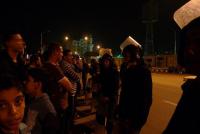-
Iran nuclear deal: how to ensure compliance?
The U.S. and European countries lifted nuclear-related sanctions against Iran on 16 January as part of a deal in which the country agreed to limit its nuclear activities and accept a new system of international inspections. The issue now is how the international community can be confident that Iran is not violating the deal. Iran agreed never to develop nuclear weapons when it signed the Nuclear Non-Proliferation Treaty in 1968. There’s no ironclad method to prevent Iran from breaking its promise and developing nuclear weapons, but this new agreement builds in a number of strong protections. In conjunction with U.S. and allied intelligence capabilities, these rules mean even a sophisticated and carefully executed secret plan would carry a high risk of detection.Looking at the deal as a whole, Iran’s best strategy for acquiring nuclear weapons would simply be to wait for restrictions on its declared enrichment program to be lifted. Assuming that the deal does not fall apart sooner, most of those provisions are scheduled to expire in 2030. In the meantime, the deal helps make a nuclear-armed Iran a less immediate prospect.
-
-
Calls for banning Muslims from entering U.S. impractical, harmful: Expert

Duke sociologist Christopher Bail, who studies how anti-Muslim organizations use social media, says that calls to ban immigration of Muslims to the United States are missing two important points. First, there is no conceivable mechanism whereby the United States could identify Muslims — short of visual cues such as headdress or religious garb, which are not worn by most Muslims. Second, and perhaps more importantly, it is surprising that people think that groups such as ISIS could not disguise terrorists they want to send to the United States as non-Muslims.
-
-
DEA, European authorities uncover massive Hezbollah drug, money-laundering operation

The U.S. Drug Enforcement Administration (DEA) yesterday announced what the agency described as a “significant enforcement activity,” including arrests targeting Lebanese Hezbollah’s External Security Organization Business Affairs Component (BAC), which is involved in international criminal activities such as drug trafficking and drug proceeds money laundering. These proceeds are used to purchase weapons for Hezbollah for its activities in Syria.
-
-
Aussie stationery chain pulls world globe which names Palestine, omits Israel
The Australian stationery chain Typo has stumbled into one of the world’s most contentious issues – and had to pull a line of globes which named Palestine but omitted the label “Israel.” Israel’s name was not omitted altogether: The globe was designed so that Israel and twelve other small countries were represented by a number on the map, corresponding to a number in a legend at the base of the globe. The globe sparked charges of anti-Semitism, but the company’s decision to halt production of the globes has led to boycott threats by Palestine advocates.
-
-
Brennan Center sues DHS, DOJ to make “Countering Violent Extremism” records public

The Brennan Center for Justice at NYU School of Law last week sued DHS and the Department of Justice under the Freedom of Information Act (FOIA) for records pertaining to an inter-agency initiative known as “Countering Violent Extremism” (CVE). The CVE initiative is designed to identify and preempt Americans from becoming involved in “violent extremism” and is being implemented in Muslim communities in several parts of the country, including the three formally designated pilot cities of Los Angeles, Boston, and Minneapolis-St. Paul.
-
-
Colombia urges U.S. to remove FARC from U.S. terror watch list
Colombia’s president Juan Manuel Santos said in an interview that he would like the United States to remove the Revolutionary Armed Forces of Colombia (FARC), a Marxist rebel group, which had fought successive Colombian governments since the early 1960s, from the U.S. list of terrorist organizations. He also said he would ask the U.S. authorities to suspend drug warrants against FARC commanders if a deal is finally signed to bring to an end the country’s five-decade civil war.
-
-
Canada’s intelligence agency halts intelligence sharing with international partners
Canada’s Communications Security Establishment (CSE), the country electronic signals intelligence agency, said it has stopped sharing intelligence with several close international partners after disclosing it had illegally collected the communication metadata of Canadian citizens in the process of eavesdropping on foreign communications. In a report to parliament last Thursday, CSE said the breach was unintentional, and that it had been discovered internally in 2013.
-
-
Boko Haram attacks force more than 1 million children from school in northeastern Nigeria

Violence and attacks against civilian populations in northeastern Nigeria and its neighboring countries have forced more than one million children out of school, UNICEF said on Tuesday. The number of children missing out on their education due to the conflict adds to the estimated eleven million children of primary school age who were already out of school in Nigeria, Cameroon, Chad, and Niger before the onset of the crisis. Across Nigeria, Cameroon, Chad, and Niger, over 2,000 schools remain closed due to attacks by Islamist group Boko Haram and the military campaign conducted against it — some of these schools for more than a year — and hundreds have been attacked, looted, or set on fire.
-
-
Boko Haram burns children to death in attack on Nigerian village

Boko Haram Islamist extremists have burned children to death in an attack on the Nigerian village of Dalori Saturday evening. In all, sixty-five people died in the attack. The militants set the buildings on fire, and as the fire spread, they shot people who were attempting to escape the flames.
-
-
Five European countries face removal from Visa Waiver program
DHS has told five countries – France, Belgium, Germany, Italy, and Greece – that they have until Monday, 1 February, to fix a security flaw – DHS described it as a “crucial loopholes”— in their passport stems. If they fail to do so, they will be removed from the Visa Waiver program. The move will affect millions of European citizens.
-
-
Anaheim police employed Stingray surveillance devices

Police in Anaheim, California have been using Stingray surveillance devices, as well as employing the more intrusive cousin, “dirtboxes,” during active investigations, without the knowledge of residents. More than 400 new documents obtained by the American Civil Liberties Union show that the department has requested funds for the technology, and that it has been using the devices since at least 2009.
-
-
U.S. mulling “decisive military action” against ISIS in Libya

Four years after the toppling of Col. Muammar Qaddafi, he United States is mulling new military campaign in Libya to help stabilize the country. Peter Cook, a Pentagon spokesman, on Wednesday said officials are currently “looking at military options” to stop the Islamic State militant group from making further gains in the North African country.
-
-
Explosive kangaroo part of teenagers' Melbourne terror plot
A 15-year old Briton and a 19-year old Australian were arrested for plotting to fill a kangaroo with explosives, paint an ISIS flag on its flank, then set it loose next to a group of police officers in order to kill as many of them as possible. The explosive kangaroo was part of a larger series of terror attacks the two, and four co-conspirators, were planning to launch in Melbourne during the 25 April 2015 commemorative services for Anzac Day, held to mark a century since the 1915 Gallipoli landings.
-
-
Vulture arrested in Lebanon for spying for Israel

A transmitter-equipped vulture from an Israeli nature reserve has been captured and detained in Lebanon after flying across the border. The Lebanese authorities arrested the vulture on suspicion of spying for Israel. The Lebanese security services ordered the release of the bird after an investigation found that it did not pose a threat.
-
-
French justice minister resigns over law stripping terrorists of citizenship

Christiane Taubira, the French justice minister, has resigned from the government ahead of a debate over proposed laws which would strip citizenship from convicted terrorists. Taubira, one of few black women in the higher reaches of French politics and a committed left-winger, has not hidden her opposition to the changes to the citizenship laws.
-
More headlines
The long view
Factories First: Winning the Drone War Before It Starts
Wars are won by factories before they are won on the battlefield,Martin C. Feldmann writes, noting that the United States lacks the manufacturing depth for the coming drone age. Rectifying this situation “will take far more than procurement tweaks,” Feldmann writes. “It demands a national-level, wartime-scale industrial mobilization.”
No Nation Is an Island: The Dangers of Modern U.S. Isolationism
The resurgence of isolationist sentiment in American politics is understandable but misguided. While the desire to refocus on domestic renewal is justified, retreating from the world will not bring the security, prosperity, or sovereignty that its proponents promise. On the contrary, it invites instability, diminishes U.S. influence, and erodes the democratic order the U.S. helped forge.
Fragmented by Design: USAID’s Dismantling and the Future of American Foreign Aid
The Trump administration launched an aggressive restructuring of U.S. foreign aid, effectively dismantling the United States Agency for International Development (USAID). The humanitarian and geopolitical fallout of the demise of USAID includes shuttered clinics, destroyed food aid, and China’s growing influence in the global south. This new era of American soft power will determine how, and whether, the U.S. continues to lead in global development.
Water Wars: A Historic Agreement Between Mexico and US Is Ramping Up Border Tension
As climate change drives rising temperatures and changes in rainfall, Mexico and the US are in the middle of a conflict over water, putting an additional strain on their relationship. Partly due to constant droughts, Mexico has struggled to maintain its water deliveries for much of the last 25 years, deliveries to which it is obligated by a 1944 water-sharing agreement between the two countries.
How Disastrous Was the Trump-Putin Meeting?
In Alaska, Trump got played by Putin. Therefore, Steven Pifer writes, the European leaders and Zelensky have to “diplomatically offer suggestions to walk Trump back from a position that he does not appear to understand would be bad for Ukraine, bad for Europe, and bad for American interests. And they have to do so without setting off an explosion that could disrupt U.S.-Ukrainian and U.S.-European relations—all to the delight of Putin and the Kremlin.”
How Male Grievance Fuels Radicalization and Extremist Violence
Social extremism is evolving in reach and form. While traditional racial supremacy ideologies remain, contemporary movements are now often fueled by something more personal and emotionally resonant: male grievance.
